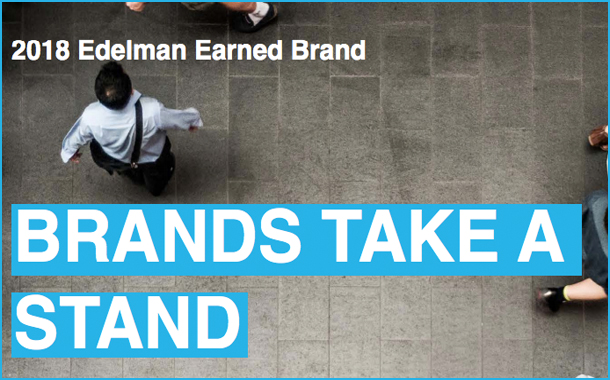Mumbai: The latest edition of the public relations firm’s Earned Brand Study spoke to consumers who wanted to engage with brands whose social values matched their own.
About 56% of consumers believe that marketers spend too much time searching for ways to force them to pay attention to their messages, rather than thinking of ways to make consumers want to pay attention.

Majority (84%) of respondents said they noticed a brand communication when it engaged their attention compared to when it interrupted (16%) their attention. Most of the attention was captured through ads (29%) and social conversations (27%).
To engage consumers, the 2018 Edelman Earned Brand study said brands need to clearly articulate why they exist and make a “proactive effort” to address that purpose. Brands are also encouraged to connect their stand with a relevant moment in culture, as well as confront a controversial issue that has a direct impact on stakeholders and/or the brand.

This comes as 64% of consumers now self-identify as belief-driven buyers, a 13% increase from 2017. According to the study, belief-driven buyers now form the majority of consumers across markets, age and income. In China, 78% of consumers are belief-driven buyers while the number stands at 68% in India. Also, nearly seven in 10 of 18 to 34 year olds buy on belief, while 67% of those aged 35 to 55 years old do so. Meanwhile, 56% of respondents aged 55 years old and above are belief-driven buyers.
When a brand takes a stand in its communication, 24% of respondents said they will talk to friends or family about the brand while 15% said they will post online, like or reply to the brand. This is compared to when brands only focus on pushing their product in their communications. Only 19% of consumers will talk to their friends about it while 12% will post online.
Besides taking a stand, 53% of consumers also believe that brands can do more to solve social ills compared to their governments. Also, 46% indicated that brands have better ideas for solving country’s problems than the government. Interestingly, while businesses are more trusted than the government in general across the markets surveyed, 84% of respondents in China were more trusting of the government than businesses (74%).

Indians were top of the chart in Brand Democracy, wherein majority of them believe brands can be a powerful force for change. 76% of Indians believe that it is easier for people to get brands to address social problems than to get government to take action. Moreover, 79% of Indians want Brands to make it easier for them to see what their values and positions on important issues, even when they are about to make a purchase.India still stood on top with 63 percent trust in social media despite dropping 6% in this year. While analysing the trust factor on Business vs Government – Business topped with 74% while government garnered 70 percent trust.

According to Rupen Desai, Vice Chairman, brand, APAC at Edelman, in Western markets, some successful brands have leaned more toward activism or politics when they take a stand. In Asia-Pacific, however, brands are more likely to hit the sweet spot by taking a stand on cultural or societal issues. For the Asia market, calibrating your stand to local cultures is crucial.
“But when a brand’s barcode carries a moral code, the opportunity to engage more consumers grows enormously,” he said.The 2018 Edelman Earned Brand study surveyed about 40,000 respondents across eight markets including China and India between June to July this year. The study focuses on how brands can earn, strengthen and protect consumer-brand relationships.

















